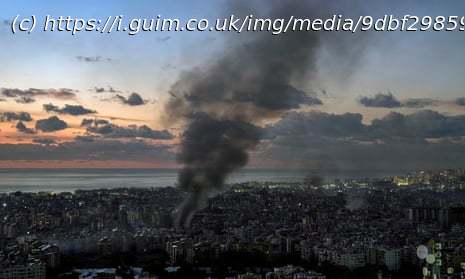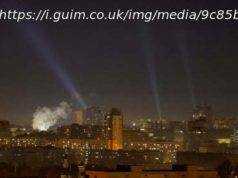Ceasefire scheduled to come into effect early on Wednesday; Macron says deal should ‘open the path’ for an ending of the war in Gaza
There are more details on the Israeli strikes late on Tuesday which targeted Lebanon’s three northern border crossings with Syria for the first time.
The strikes, Reuters reports, came moments after U.S. President Joe Biden announced that a ceasefire would come into effect on Wednesday to halt hostilities between Lebanese armed group Hezbollah and Israel.
Syria’s Red Crescent said a volunteer was killed and another was injured “as they were performing their humanitarian duty of rescuing the wounded early on Wednesday”. The strike damaged several ambulances and work points, it added in a statement.
Syrian state TV reported 18 people were injured, some in critical condition, in an Israeli strike on the Arida border crossing, with the wounded transported to nearby hospitals, while casualties were also reported in a separate Israeli strike on the Dabousieh border crossing with Lebanon.
The Israeli military did not immediately comment. It has previously stated that it targets what it says are Iran-linked sites in Syria as part of a broader campaign to curb the influence of Iran and its ally Hezbollah in the region.Terms of the ceasefire
The 60-day ceasefire between Israel and Hezbollah is due to go into effect at 4am local time (0200 GMT) on Wednesday.
Under the deal’s terms, Israel will withdraw entirely from southern Lebanon, while Hezbollah will move its heavy weaponry north of the Litani River, about 16 miles (25km) north of the border.
During the transition phase, the Lebanese army will deploy to the buffer border zone alongside the existing UN peacekeeping force. Longstanding border disputes will be discussed after the 60-day withdrawal period.
The US is expected to be a key security guarantor. American troops will not be committed to the Israel-Lebanon border but the US, France and its allies would provide the “necessary assistance” to ensure the deal is implemented “fully and effectively”, US President Joe Biden said. He said the ceasefire was designed to lead to “a permanent cessation of hostilities”.
Importantly for Israel, Hezbollah dropped its demand that a ceasefire in Lebanon was contingent on ending the fighting in Gaza. Prime minister Benjamin Netanyahu said Israel would “maintain full freedom of military action” in Lebanon “with the United States’ full understanding”.
“If Hezbollah violates the agreement and tries to arm itself, we will attack,” Netanyahu said.Lebanon’s prime minister says ceasefire a ‚fundamental step’ towards regional stability
Lebanon’s prime minister, Najib Mikati, earlier welcomed a ceasefire agreement between Israel and Hezbollah during a call with the US president, Joe Biden, on Tuesday.
A series of posts on X from Mikati described the proposal as a “fundamental step towards restoring calm and stability in Lebanon and enabling displaced persons to return to their towns and cities”.
He thanked the US and France for their involvement, and reiterated his government’s commitment to “strengthen the army’s presence in the south”. Mikati said:
While I value the joint efforts of the United States and France in reaching this understanding, I reaffirm the government’s commitment to implementing UN security council Resolution 1701, enhancing the presence of the Lebanese Army in the South, and cooperating with the United Nations Interim Force in Lebanon (Unifil).
News of the Israel-Hezbollah ceasefire deal has been welcomed by world leaders.
The UK’s prime minister, Keir Starmer, called for the ceasefire to be turned into “a lasting political solution”, adding that Britain and its allies will continue to be at the “forefront of efforts to break the ongoing cycle of violence” to achieve a “long-term, sustainable” peace in the Middle East.
The president of the EU commission, Ursula von der Leyen, described it as “very encouraging news”.
French President Emmanuel Macron said that a ceasefire deal agreed between Israel and Lebanon should “open the path” for an ending of the war in Gaza.
UN secretary-general António Guterres said “he hopes that this agreement can put an end to the violence, destruction and suffering the people of both countries have been experiencing”.
Start
United States
USA — Events Middle East crisis live: Israel-Hezbollah ceasefire due to begin at 02.00 GMT...






